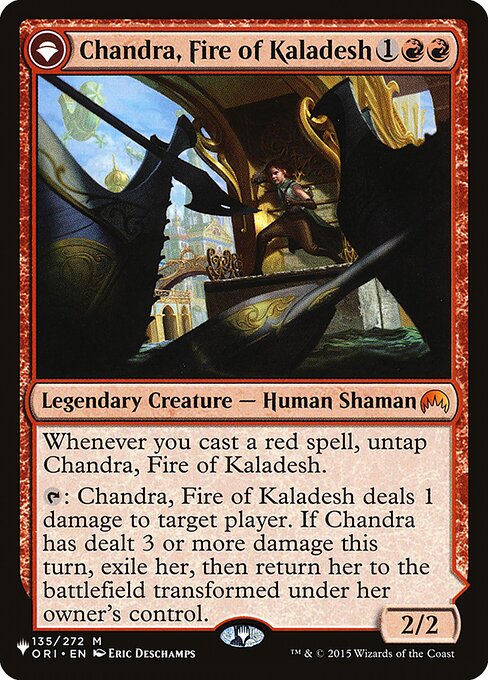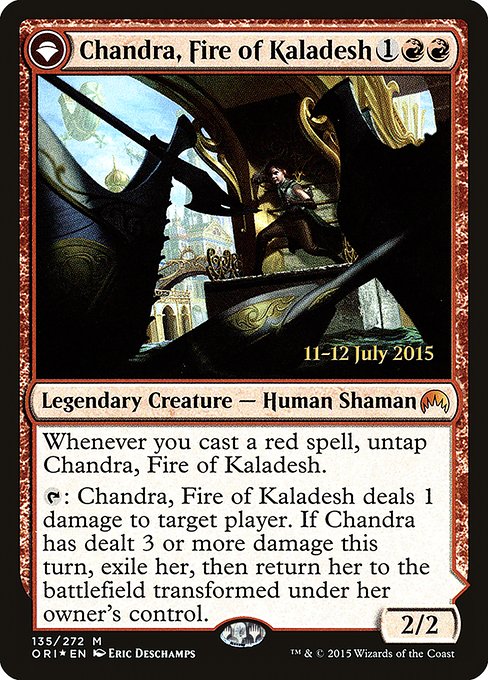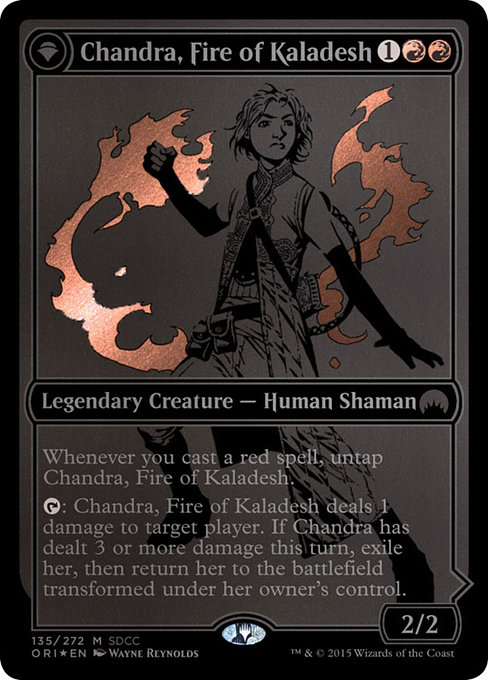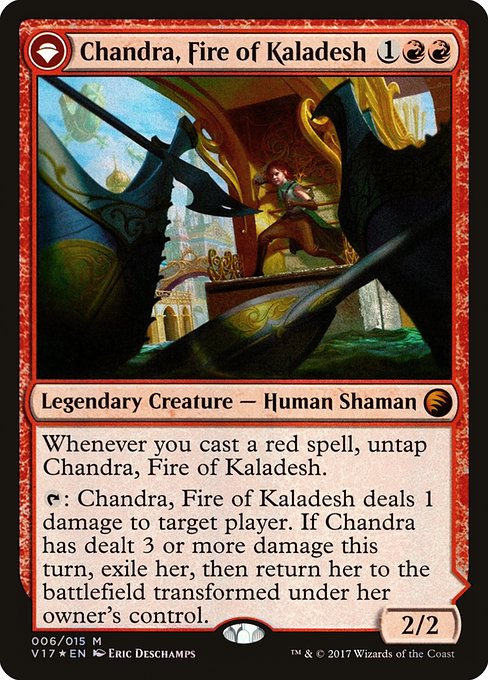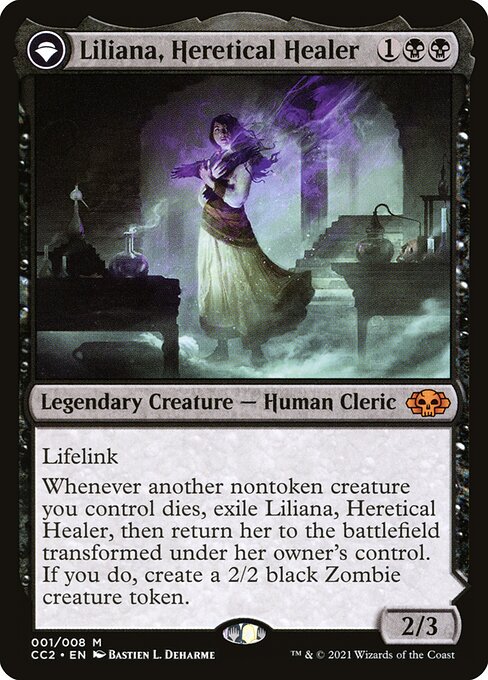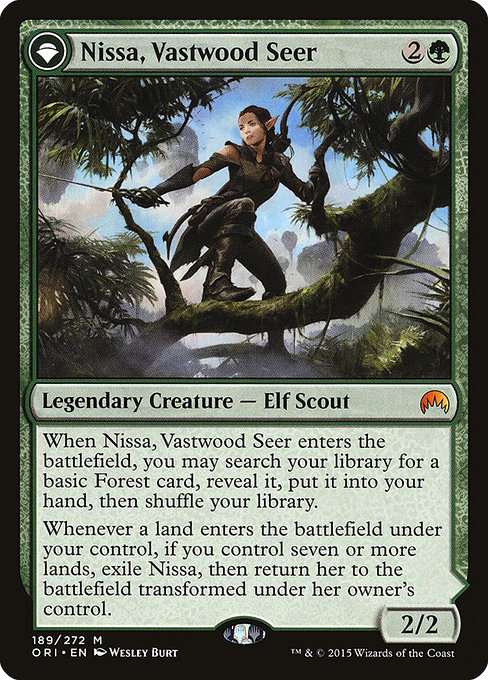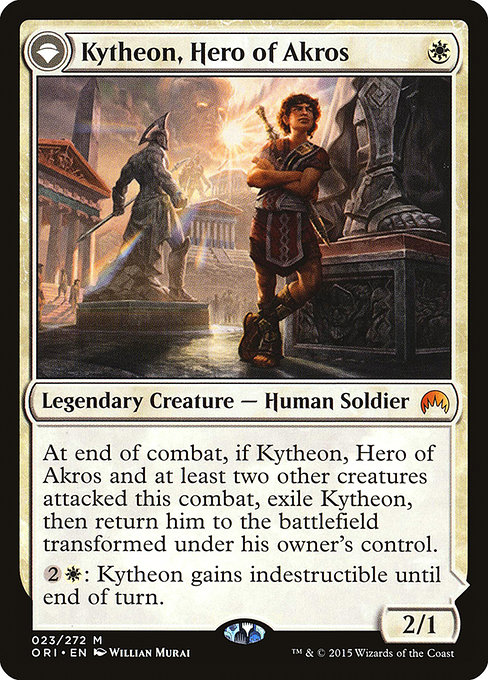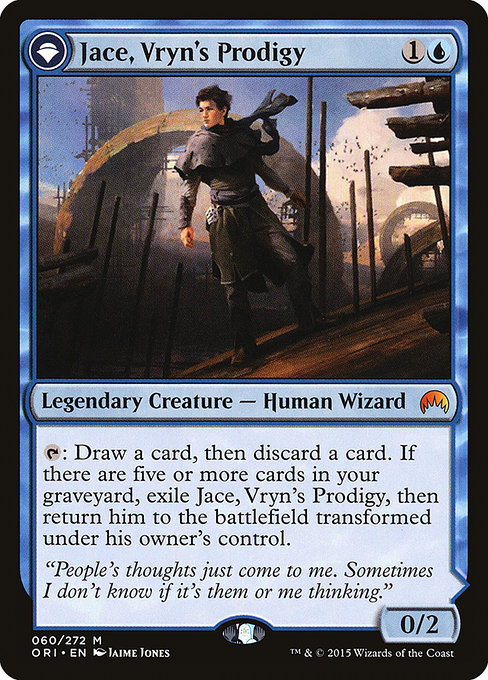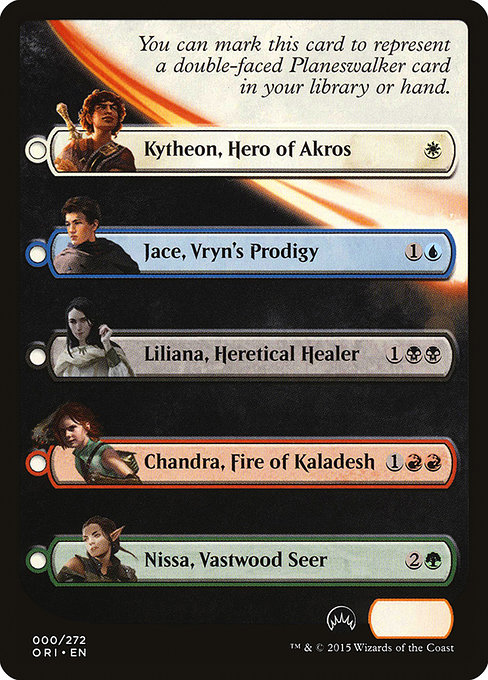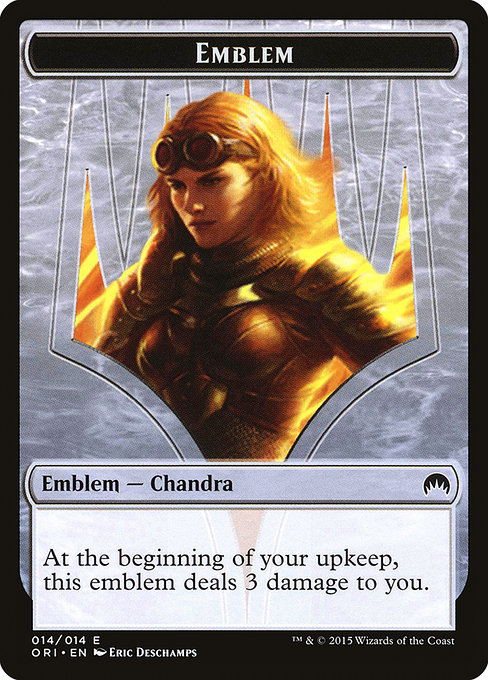standard
future
historic
gladiator
pioneer
explorer
modern
legacy
pauper
vintage
penny
commander
brawl
alchemy
paupercommander
duel
oldschool
premodern
Rulings
A double-faced card enters the battlefield with its front face up by default, unless a spell or ability instructs you to put it onto the battlefield transformed, in which case it enters with its back face up.
The back face of a double-faced card (in the case of Magic Origins, the planeswalker face) can’t be cast.
Chandra, Fire of Kaladesh’s activated ability will count any damage Chandra has dealt during the turn to any permanent or player, including combat damage.
The mana value of a double-faced card not on the battlefield is the mana value of its front face.
You can activate one of the planeswalker’s loyalty abilities the turn it enters the battlefield. However, you may do so only during one of your main phases when the stack is empty. For example, if the planeswalker enters the battlefield during combat, there will be an opportunity for your opponent to remove it before you can activate one of its abilities.
The last sentence of Chandra, Fire of Kaladesh’s activated ability isn’t a separate ability. The check happens only as that activated ability resolves. You must activate the ability in order to exile Chandra and return her to the battlefield transformed, even if Chandra has already dealt 3 or more damage during the turn.
Only players actually dealt damage by the third ability of Chandra, Roaring Flame will get an emblem. If all of that damage to a player is prevented, that player won’t get an emblem. If any of that damage is redirected to Chandra’s controller, that player will get an emblem.
A Magic Origins planeswalker that enters the battlefield because of the ability of its front face will enter with loyalty counters as normal.
If a double-faced card is manifested, it will be put onto the battlefield face down (this is also true if it’s put onto the battlefield face down some other way). Note that “face down” is not synonymous with “with its back face up.” A manifested double-faced card is a 2/2 creature with no name, mana cost, creature types, or abilities. While face down, it can’t transform. If the front face of a manifested double-faced card is a creature card, you can turn it face up by paying its mana cost. If you do, its front face will be up. A double-faced card on the battlefield can’t be turned face down.
Each player who gets Chandra’s emblem is the owner of that emblem. In multiplayer games, that emblem will remain in the game as long as its owner does, even if Chandra’s owner leaves the game.
Each face of a double-faced card has its own set of characteristics: name, types, subtypes, power and toughness, loyalty, abilities, and so on. While a double-faced card is on the battlefield, consider only the characteristics of the face that’s currently up. The other set of characteristics is ignored. While a double-faced card isn’t on the battlefield, consider only the characteristics of its front face.
In some rare cases, a spell or ability may cause one of these five cards to transform while it’s a creature (front face up) on the battlefield. If this happens, the resulting planeswalker won’t have any loyalty counters on it and will subsequently be put into its owner’s graveyard.
The emblem created by Chandra, Roaring Flame is colorless. The damage it deals is from a colorless source.
The back face of a double-faced card doesn’t have a mana cost. A double-faced permanent with its back face up has a mana value equal to the mana value of its front face. Each back face has a color indicator that defines its color.
For more information on double-faced cards, see the Shadows over Innistrad mechanics article (http://magic.wizards.com/en/articles/archive/feature/shadows-over-innistrad-mechanics).
You can control two of this permanent, one front-face up and the other back-face up, at the same time.
The back face of a double-faced card (in the case of Magic Origins, the planeswalker face) can’t be cast.
Chandra, Fire of Kaladesh’s activated ability will count any damage Chandra has dealt during the turn to any permanent or player, including combat damage.
The mana value of a double-faced card not on the battlefield is the mana value of its front face.
You can activate one of the planeswalker’s loyalty abilities the turn it enters the battlefield. However, you may do so only during one of your main phases when the stack is empty. For example, if the planeswalker enters the battlefield during combat, there will be an opportunity for your opponent to remove it before you can activate one of its abilities.
The last sentence of Chandra, Fire of Kaladesh’s activated ability isn’t a separate ability. The check happens only as that activated ability resolves. You must activate the ability in order to exile Chandra and return her to the battlefield transformed, even if Chandra has already dealt 3 or more damage during the turn.
Only players actually dealt damage by the third ability of Chandra, Roaring Flame will get an emblem. If all of that damage to a player is prevented, that player won’t get an emblem. If any of that damage is redirected to Chandra’s controller, that player will get an emblem.
A Magic Origins planeswalker that enters the battlefield because of the ability of its front face will enter with loyalty counters as normal.
If a double-faced card is manifested, it will be put onto the battlefield face down (this is also true if it’s put onto the battlefield face down some other way). Note that “face down” is not synonymous with “with its back face up.” A manifested double-faced card is a 2/2 creature with no name, mana cost, creature types, or abilities. While face down, it can’t transform. If the front face of a manifested double-faced card is a creature card, you can turn it face up by paying its mana cost. If you do, its front face will be up. A double-faced card on the battlefield can’t be turned face down.
Each player who gets Chandra’s emblem is the owner of that emblem. In multiplayer games, that emblem will remain in the game as long as its owner does, even if Chandra’s owner leaves the game.
Each face of a double-faced card has its own set of characteristics: name, types, subtypes, power and toughness, loyalty, abilities, and so on. While a double-faced card is on the battlefield, consider only the characteristics of the face that’s currently up. The other set of characteristics is ignored. While a double-faced card isn’t on the battlefield, consider only the characteristics of its front face.
In some rare cases, a spell or ability may cause one of these five cards to transform while it’s a creature (front face up) on the battlefield. If this happens, the resulting planeswalker won’t have any loyalty counters on it and will subsequently be put into its owner’s graveyard.
The emblem created by Chandra, Roaring Flame is colorless. The damage it deals is from a colorless source.
The back face of a double-faced card doesn’t have a mana cost. A double-faced permanent with its back face up has a mana value equal to the mana value of its front face. Each back face has a color indicator that defines its color.
For more information on double-faced cards, see the Shadows over Innistrad mechanics article (http://magic.wizards.com/en/articles/archive/feature/shadows-over-innistrad-mechanics).
You can control two of this permanent, one front-face up and the other back-face up, at the same time.
Rulings
A double-faced card enters the battlefield with its front face up by default, unless a spell or ability instructs you to put it onto the battlefield transformed, in which case it enters with its back face up.
The back face of a double-faced card (in the case of Magic Origins, the planeswalker face) can’t be cast.
Chandra, Fire of Kaladesh’s activated ability will count any damage Chandra has dealt during the turn to any permanent or player, including combat damage.
The mana value of a double-faced card not on the battlefield is the mana value of its front face.
You can activate one of the planeswalker’s loyalty abilities the turn it enters the battlefield. However, you may do so only during one of your main phases when the stack is empty. For example, if the planeswalker enters the battlefield during combat, there will be an opportunity for your opponent to remove it before you can activate one of its abilities.
The last sentence of Chandra, Fire of Kaladesh’s activated ability isn’t a separate ability. The check happens only as that activated ability resolves. You must activate the ability in order to exile Chandra and return her to the battlefield transformed, even if Chandra has already dealt 3 or more damage during the turn.
Only players actually dealt damage by the third ability of Chandra, Roaring Flame will get an emblem. If all of that damage to a player is prevented, that player won’t get an emblem. If any of that damage is redirected to Chandra’s controller, that player will get an emblem.
A Magic Origins planeswalker that enters the battlefield because of the ability of its front face will enter with loyalty counters as normal.
If a double-faced card is manifested, it will be put onto the battlefield face down (this is also true if it’s put onto the battlefield face down some other way). Note that “face down” is not synonymous with “with its back face up.” A manifested double-faced card is a 2/2 creature with no name, mana cost, creature types, or abilities. While face down, it can’t transform. If the front face of a manifested double-faced card is a creature card, you can turn it face up by paying its mana cost. If you do, its front face will be up. A double-faced card on the battlefield can’t be turned face down.
Each player who gets Chandra’s emblem is the owner of that emblem. In multiplayer games, that emblem will remain in the game as long as its owner does, even if Chandra’s owner leaves the game.
Each face of a double-faced card has its own set of characteristics: name, types, subtypes, power and toughness, loyalty, abilities, and so on. While a double-faced card is on the battlefield, consider only the characteristics of the face that’s currently up. The other set of characteristics is ignored. While a double-faced card isn’t on the battlefield, consider only the characteristics of its front face.
In some rare cases, a spell or ability may cause one of these five cards to transform while it’s a creature (front face up) on the battlefield. If this happens, the resulting planeswalker won’t have any loyalty counters on it and will subsequently be put into its owner’s graveyard.
The emblem created by Chandra, Roaring Flame is colorless. The damage it deals is from a colorless source.
The back face of a double-faced card doesn’t have a mana cost. A double-faced permanent with its back face up has a mana value equal to the mana value of its front face. Each back face has a color indicator that defines its color.
For more information on double-faced cards, see the Shadows over Innistrad mechanics article (http://magic.wizards.com/en/articles/archive/feature/shadows-over-innistrad-mechanics).
You can control two of this permanent, one front-face up and the other back-face up, at the same time.
The back face of a double-faced card (in the case of Magic Origins, the planeswalker face) can’t be cast.
Chandra, Fire of Kaladesh’s activated ability will count any damage Chandra has dealt during the turn to any permanent or player, including combat damage.
The mana value of a double-faced card not on the battlefield is the mana value of its front face.
You can activate one of the planeswalker’s loyalty abilities the turn it enters the battlefield. However, you may do so only during one of your main phases when the stack is empty. For example, if the planeswalker enters the battlefield during combat, there will be an opportunity for your opponent to remove it before you can activate one of its abilities.
The last sentence of Chandra, Fire of Kaladesh’s activated ability isn’t a separate ability. The check happens only as that activated ability resolves. You must activate the ability in order to exile Chandra and return her to the battlefield transformed, even if Chandra has already dealt 3 or more damage during the turn.
Only players actually dealt damage by the third ability of Chandra, Roaring Flame will get an emblem. If all of that damage to a player is prevented, that player won’t get an emblem. If any of that damage is redirected to Chandra’s controller, that player will get an emblem.
A Magic Origins planeswalker that enters the battlefield because of the ability of its front face will enter with loyalty counters as normal.
If a double-faced card is manifested, it will be put onto the battlefield face down (this is also true if it’s put onto the battlefield face down some other way). Note that “face down” is not synonymous with “with its back face up.” A manifested double-faced card is a 2/2 creature with no name, mana cost, creature types, or abilities. While face down, it can’t transform. If the front face of a manifested double-faced card is a creature card, you can turn it face up by paying its mana cost. If you do, its front face will be up. A double-faced card on the battlefield can’t be turned face down.
Each player who gets Chandra’s emblem is the owner of that emblem. In multiplayer games, that emblem will remain in the game as long as its owner does, even if Chandra’s owner leaves the game.
Each face of a double-faced card has its own set of characteristics: name, types, subtypes, power and toughness, loyalty, abilities, and so on. While a double-faced card is on the battlefield, consider only the characteristics of the face that’s currently up. The other set of characteristics is ignored. While a double-faced card isn’t on the battlefield, consider only the characteristics of its front face.
In some rare cases, a spell or ability may cause one of these five cards to transform while it’s a creature (front face up) on the battlefield. If this happens, the resulting planeswalker won’t have any loyalty counters on it and will subsequently be put into its owner’s graveyard.
The emblem created by Chandra, Roaring Flame is colorless. The damage it deals is from a colorless source.
The back face of a double-faced card doesn’t have a mana cost. A double-faced permanent with its back face up has a mana value equal to the mana value of its front face. Each back face has a color indicator that defines its color.
For more information on double-faced cards, see the Shadows over Innistrad mechanics article (http://magic.wizards.com/en/articles/archive/feature/shadows-over-innistrad-mechanics).
You can control two of this permanent, one front-face up and the other back-face up, at the same time.
Votre collection ? vos decks ?
Envie de gérer votre collection et/ou créer des decks ?
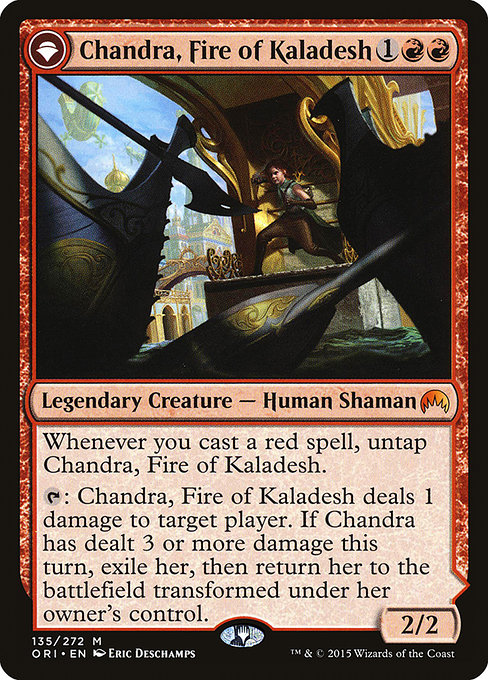

 0
0
 1.47€
1.47€
